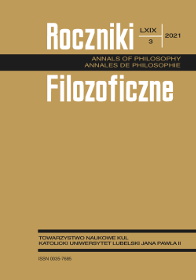Benevolence or Mercy? The Problem with the First Premise of the Hiddenness Argument
Benevolence or Mercy? The Problem with the First Premise of the Hiddenness Argument
Author(s): Ryszard MordarskiSubject(s): Philosophy, Special Branches of Philosophy, Philosophy of Science
Published by: Towarzystwo Naukowe KUL & Katolicki Uniwersytet Lubelski Jana Pawła II
Keywords: Hiddenness Argument; God’s love; attributes of God; models of Christian love; benevolent theism; merciful theism; J. L. Schellenberg
Summary/Abstract: The first premise of J. L. Schellenberg’s Hiddenness Argument equates God’s love with a positive relationship to human beings. To illustrate this relationship, the human model of parental love is used, based on the standards of the modern American liberal world, not on the biblical standard. As a result, we attribute to God a narrowly understood horizontal relationship towards people, which is completely alien to the understanding of love developed in the Christian tradition. When we refer to the classical theism that recognized love as the central attribute of God, we will see that it should be understood in a vertical model, consisting in the offering of good and mercy. This understanding undermines the benevolent theism and replaces it with the merciful theism or theism of mercy. Ultimately, this makes the first premise of the Hiddenness Argument very questionable and the whole argument calls for a significant revision.
Journal: Roczniki Filozoficzne
- Issue Year: 69/2021
- Issue No: 3
- Page Range: 123-139
- Page Count: 17
- Language: English

